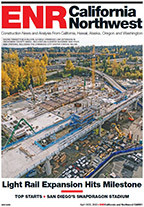North of San Francisco, the North Bay’s first commuter rail line is inching toward construction. Meandering through the hilly suburbs of Marin County and the farms and vineyards of Sonoma County, the new rail line is designed to relieve pressure from the jam-packed 101 Freeway, providing a less stressful ride for North Bay commuters.

As the Sonoma-Marin Area Rail Transit system moves ahead, other California rail projects—such as the $100-billion San Francisco-to-Anaheim high-speed rail line—are hitting some speed bumps.
Last month, the Bay Area’s Metropolitan Transportation Commission released $33.1 million to the Sonoma-Marin Area Rail Transit (SMART) system, which recently received an additional $18-million grant from the federal government. Together, the money will fund first-phase construction of a 70-mile passenger railroad and parallel bicycle-pedestrian path along the publicly owned Northwestern Pacific Railroad right-of-way, running through Larkspur in southern Marin County and Cloverdale in northern Sonoma County.
The first contract, a $100-million design-build package, will be awarded in the next few months.
“This is for 35 miles of track reconstruction and bridge rehabilitation and replacement from Santa Rosa to San Rafael,” says Bill Gamlen, SMART chief engineer. “We prequalified nine teams back in March, did a review in July and issued a final RFP in September.”
Oakland-based Shimmick Construction Co. Inc., as well as the joint venture of Alameda-based Stacy and Witbeck and St. Joseph, Mo.-based Herzog, await word on the winner. The agency hopes to see construction get under way by spring, according to Gamlen.
Other contracts for the first phase of the SMART system slated to be awarded next year include two miles of track and tunnel in San Rafael for $15 million, a systems contract to install a train signaling system and platform communications for $50 million to $60 million, a swing-span bridge for $15 million to $20 million, and an operations maintenance facility for $15 million to $20 million.
When all phases are complete, the entire project will have 14 stations along its route. The self-propelled rail cars are in the design stage and will be built in Japan by Sumitomo Corp. of America. Assembly will take place at a new plant now being built in Rochelle, Ill. Two cars can transport up to 158 people and reach speeds of up to 79 miles per hour. Service is set to begin in 2014.
The Sumitomo contract price was about $57 million for 18 Diesel Multiple Units (DMUs).


Post a comment to this article
Report Abusive Comment